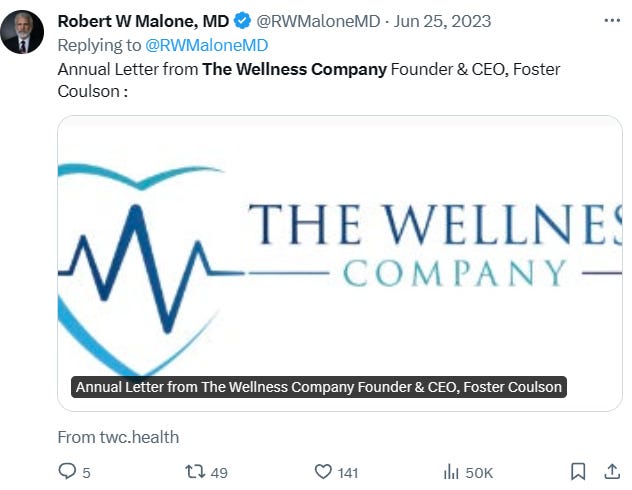Ignoring the Simple Market Solution to Expensive Vitamins
Chaos Agents, Part 25
Click here to see other articles on Chaos Agents. Some more active conversation about topics such as this can be found at the RTE Locals channel.
What is the right cost for a bottle of vitamins that costs $3.50 to produce?
This is not a trick question, but it's a tricky enough question that I haven't heard a good answer from anyone after talking about the topic with numerous doctors in the Medical Freedom Movement (MFM) ecosystem, and a few others.
The reason why the topic comes up is that I'm told by several doctors who were either involved or associated with those involved that $3.50 is the cost to produce a bottle of Zelenko vitamins by somebody involved in The Wellness Company's (TWC's or possibly technically a Zelenko-named subsidiary?). Of course, TWC has been the subject of quite a bit of controversy lately.
The vitamin sales, which I'm told are in the nine-digits (somebody please correct me if this is wrong) have been the subject of angry targeting from those in the MFM, such as Dr. Lynn Fynn, who claims that they are "substandard supplements", but never shared with me her analysis as to why. But she and other doctors patted themselves on the back for not selling vitamins (profiteering from the pandemic), and some of the doctors who previously did stopped doing so.
These vitamin/supplement sales have also been targeted as a stain on the ReAwaken America Tour by NPR:
$500 handbags and $3,300 exercise equipment
Plenty of money does change hands though. Dietary supplements, fluoride-free toothpaste, patriotic coffee and children's books like "The Cat In The Maga Hat" are all on sale. Bedazzled purses in the shape of a gun or the Titanic (a metaphor for the country) cost $500.
Carson Massie was selling vibrating platforms you can stand on instead of exercising. "Ten minutes on this is equal to an hour at the gym," said Massie. The units go for $3,300 each, a steal compared to other models on the market, he said. Their stand sells about 150 on an average ReAwaken day.
Robert Malone previously promoted Foster Coulson and The Wellness Company as of mid-2023.
Now that Malone and Peter McCullough seem more overtly like rivals, having ironically parted from the Unity Project, Malone suddenly seems happy to bury The Wellness Company.
Instead of quoting Kristin's article breaking the stories of Foster Coulson's interesting business relationships, Malone gathered primary sources and quoted from TrialSiteNews, where he has his own established relationship having served on the Advisory Committee. And it amuses me to see Malone call out defense industry ties without a smoking gun on perverse incentives.
That made me giggle, just a little.
Enter Coulson’s International Health Brands (IHB), created along with ex-Navy Seal with supposed defense ties, Dave Lopez. IC LLC, IHB, and TWC (at least during the startup phase) appear to all share the same address in Boca Raton, Florida. These related firms are each designed to support or monetize (depending on one’s perspective), particular areas of health. But we emphasize that according to CEO Peter Gillooly, any of Coulson’s investments are completely separated, firewalled and not influencing each other.
Is all this just rivalrous opportunism?
I'd like to turn to basic economics to answer the question…
Every Doctor is Responsible for Overpriced Supplements
First, understand that I'm not calling anyone's supplements "overpriced". Markets involve subjective pricing, and some people pay a premium to an educator or appealing brand.
However, when there are multiple, similar brands in a space, the game theory of price competition, absent collusion, generally results in the collapse of prices toward much lower profitability associated with the technological factor of the industry.
I'll put it plainly:
If you don't want people profiteering, the simplest solution is to compete at a lower price.
This form of profiteering requires a monopoly, which requires everyone else to step aside passively. It takes two to dance the tango, as I mentioned a few weeks ago when I interviewed Kristin and Liam about the TWC article they worked on together.

It was made clear to me by numerous doctors that they had vitamin/supplement brands they could sell. Some of them even stopped selling. In other words, it took all parties to create an industry niche monopoly that could charge $50 for a $3.50(ish) bottle of vitamins.
And if you're worried about being seen as a profiteer, just donate excess proceeds to a worthy (or "worthy") cause—like maybe a legal fund, or to keep Steve Kirsch from having to raise $100M to run a terribly-designed hedge fund in order to fund his Vaccine Safety Research Foundation (whose budget is a pittance compared to the tens or hundreds of millions in profits from vitamins/supplements). Anything that keeps money in the hands of people who need it, or keeps Steve from yapping about bad stats, is worth the effort—particularly for those already set up to do it.
It's that simple, and there are too many business minds in the ecosystem not to know it. We are either witnessing an unnerving level of greed, possibly collusion masked by fake fights (I suspect some people are in on it, but some are not), or simple stupidity. Maybe a mixture. Remember that the next time you see doctors flying a "unity" banner while complaining about the profiteering of others in their close ecosystem.





Reminder on good etiquette: It is appropriate to read the article to make sure that your comments "at" me relate to what I wrote, and not what you imagined might be written other than what you would have written. If you're uncertain, think, "I should quote a part of the article that I'm responding to in order to be certain that I understand the difference between the article and my biases filling in blanks."
Important observations:
* I made no argument for or against vitamins/supplements in general in this article (though readers of RTE can find many dozens of articles where some of that is covered).
* I made no argument regarding the quality of TWC's vitamins/supplements.
Anyone confused by this may want to read the article carefully a second (or first) time.
Fixed typo: "First, understand that I'm not calling anyone's supplements "overpriced". "